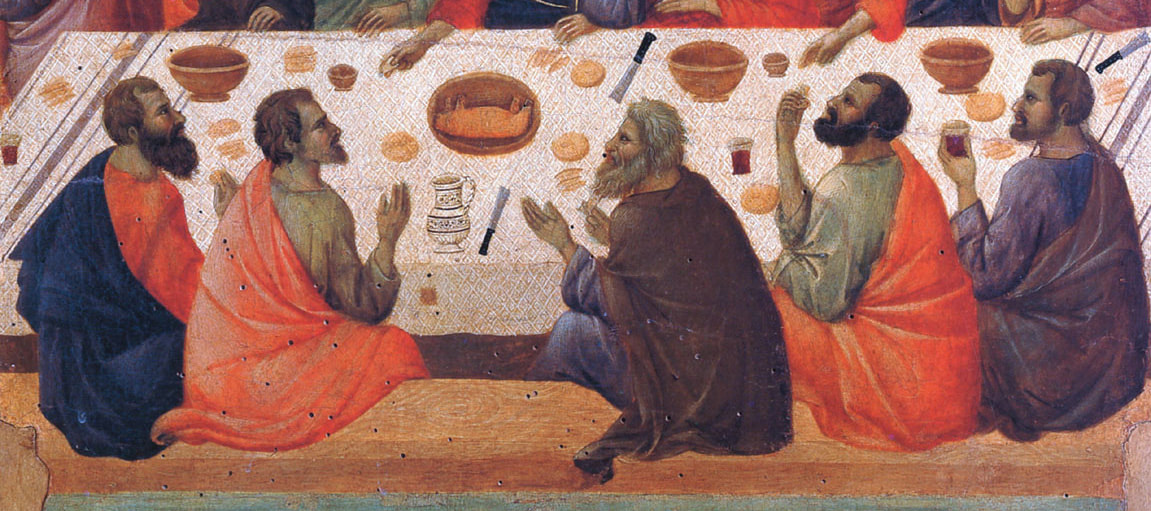|
Instead of focusing on the stories we know well about Peter and the other leading disciples and what may be unfounded legends and traditions regarding the others, whenever possible this book, by R. Herbert, looks at what the Bible tells us about the group as a whole – something we often read over without thought. Yet what the New Testament tells us about the group Jesus chose is not simply background information and often teaches some profoundly important lessons that were written for our education. Lessons from the Lives of the Twelve Disciples is available in formats for computer, e-book reader, or smart phone. You can download a free copy from the e-books page on this website, or from FreeChristianEBooks.org, here.
Rejoice greatly, Daughter Zion! Shout, Daughter Jerusalem! See, your king comes to you, righteous and victorious, lowly and riding on a donkey, on a colt, the foal of a donkey (Zechariah 9:9).
The Gospel of Luke recounts how Jesus fulfilled the words spoken by the prophet Zechariah as he entered Jerusalem in a “triumphal entry” during the climactic week at the end of his ministry (Luke 19:28-44). Luke tells us how Jesus instructed two of his disciples to go to a nearby home where they would find a young donkey and to bring it to him. He told the disciples that if anyone challenged them, they were to simply say: “The Lord needs it” (Luke 19:31). The disciples did this – explaining to the donkey’s owners what Jesus had told them. This initial part of the story is interesting in itself. Jesus was, in effect, invoking the ancient principle of angaria (from a Babylonian word meaning “mounted messenger”) by which kings, rulers and other individuals with official responsibilities could requisition property for official use. Angaria originated in the earliest postal systems in the ancient Persian, Greek and later Roman cultures where an animal could be “requisitioned” from its owner to carry the mail on the next stage of its multiple-staged journey, somewhat equivalent to the “Pony Express” of the American frontier. In the Judea of Jesus’ day, under Roman rule, animals could be commandeered in this way for the emperor’s service, and the right was also expanded to include the needs of the king, and even magistrates and rabbis. A Messenger Received in Joy This incident was, then, the prelude to the actual triumphal entry in which the crowds provided what we would call today a “red carpet” entry for Jesus by covering the road with their capes and the branches of trees to welcome him as he rode on the donkey into the city (Luke 19:35-37). The scene was not unlike a humbler version of the great Roman “Triumphs” in which the grateful citizens celebrated the procession of heroes who had served the people. In fact, the similarity with a Roman Triumph is more than superficial, because the Triumph was a civil and religious ceremony which was held to publicly “celebrate and sanctify” the success of a commander who had led his forces to victory in the service of the people. But Jesus rejected the aggrandizing nature of the pagan Triumphs which fed the cult of personalities in Roman and other cultures, and he did this by riding humbly on a young donkey – the antithesis of the great horses of conquering kings and heroes – while fulfilling the prophecy of Zechariah 9:9 in every detail. Yet Jesus did accept the people’s praise (Luke 19:40), and the details of the story from beginning to end show that a triumphal entry – a symbolic victory celebration – was intended. The words of the crowds who welcomed Jesus in this triumphal entry are important. Luke tells us (Luke 19:38) that the crowds quoted from the great messianic Psalm 118 – which is why the Pharisees attempted to silence them (Luke 19:39). This is the same psalm that contains, in vs. 22, the statement so significantly quoted by Jesus in Luke 20:17: “The stone the builders rejected has become the cornerstone.” But also this psalm contains clear references to the triumphal entry of the Messiah: * I look in triumph on my enemies (Psalm 118:7). * I will not die but live, and will proclaim what the Lord has done (vs. 17). * Open for me the gates of the righteous; I will enter and give thanks to the Lord (vs. 19). * Blessed is he who comes in the name of the Lord. From the house of the Lord we bless you. The Lord is God, and he has made his light shine on us. With boughs in hand, join in the festal procession up to the horns of the altar (vss. 26-27). Although Luke only cites a few of the words from Psalm 118, the psalm is in fact a full prophetic description of Jesus’ triumphal entry into Jerusalem. What Was the Victory? But if this was a triumph, what was the victory? Jesus had not yet defeated sin and death on the cross, and he had not yet completed the work he came to accomplish in this regard. Yet there was one way in which a victory was surely celebrated. The primary purpose of the angaria, by which Jesus obtained the donkey on which he rode, was to deliver a message. And at this point, at the end of his ministry, Jesus had successfully delivered the news of the kingdom of God to the point that it was now established and would continue to spread throughout the world. He had also lived the perfect life needed in order that he could give himself as a sacrifice for all humankind. In that sense, Jesus had fully triumphed in his work when he came to Jerusalem as “... your king who comes to you, righteous and victorious, lowly and riding on a donkey” (Zechariah 9:9, emphases added). The entry of Jesus into Jerusalem prior to his death was indeed a triumph: it celebrated Jesus’ righteous life and the fact that he had succeeded in delivering the message that he brought into the world. There is surely a lesson in this for us. In following Christ as his disciples we do not attempt to mimic everything he did, of course, but we should certainly follow in many of his steps, as he commanded us. The dual nature of Christ’s fulfilled mission – of living in obedience to God and carrying his message – is a dual opportunity and goal for every one of his followers, also. To focus only on our own obedience or only on the message we were commissioned to carry is not a complete fulfillment of the calling we have been given. To the extent that we are able, with God’s help, to live lives pleasing to God and to serve him in carrying his message, we too participate in the victory of Jesus. |
BLOGFor a smart browser-bookmark showing new blog postings, click on the RSS Feed icon.
Author :Unless otherwise stated, blog posts are written by R. Herbert, Ph.D., who writes for a number of Christian venues – including our sister site: TacticalChristianity.org Categories :
All
Archives :
July 2024
Community :
|


 RSS Feed
RSS Feed
